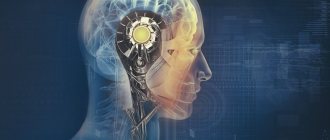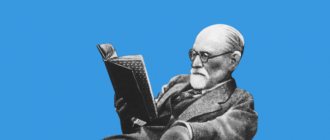Psychology is a multifaceted and versatile science. It has many directions and branches, each of which is focused on its own understanding of mental reality and the characteristics of its functioning. Each direction has its own approach to analyzing aspects of the psyche. Cognitive psychology is one of the relatively young, but quite progressive and very popular areas. This article is devoted to a brief overview of this area, as well as an overview of the related therapeutic approach - cognitive psychotherapy.
Modern Perspectives
Contemporary perspectives in cognitive psychology generally address cognition as a dual process theory, outlined by Daniel Kahneman in 2011. Kahneman differentiated two more processing styles, calling them intuition and reasoning. Intuition (or system 1), similar to associative reasoning, has been defined to be fast and automatic, usually with strong emotional connections involved in the reasoning process. Kahneman says that this kind of reasoning was based on formed habits and was very difficult to change or manipulate. Reasoning (or system 2) was slower and much more unstable, subject to conscious judgments and attitudes.
Types of cognitive processes
Low or basic
Sensation and perception
A sensation is something that is formed under the action of various stimuli, as well as the determination of signals from a person’s environment. He accepts them with the help of his feelings. This is how information is acquired from the environment around you. Data comes from the outside world, and sometimes from the human body. The process of perceiving a basic type includes some interpretation of the information received.
Attention! There is plenty of information around, yet each person has the ability, having received many different signal stimuli, to pay attention to what is really interesting to her. Some actions do not require attention
This is, for example, moving or chewing food. Others require attention without fail, such as speech or body language.
Some processes that are repeated often in life are done automatically. When learning to drive a car, it is difficult to immediately act in a coordinated manner, but then less and less effort is put in, as automaticity develops.
About memory
Human memory stores answers to a fairly large number of different questions. It encrypts data, it is able to save it, and then restore it if necessary. The classification of types of memory is as follows:
- Memory is short or short-term;
- Sensory type memory;
- Semantic type memory;
- Working memory;
- Autobiographical memory and others.
All of these species are capable of interacting or not. For example, if a person with amnesia remembers where he needs to go today, he may forget the name of his closest relative.
Attention and memory
Processes are complex and higher
Intelligence or mind
This concept means an ability that gives an individual the ability to solve a variety of problems. Some scientists have popularized in society the theory that there is no intelligence, but only different abilities that are used according to the situation or activity.
On a note
In order to skillfully deal with different circumstances in everyday life, many researchers emphasize the importance of emotional intelligence
Thinking
Human thoughts are complex and heterogeneous. This process is necessary in order to make decisions, reason, solve problems, and think creatively.
In order to make these functions somewhat simpler, the human brain creates judgments and inferences. In order for mental processes to speed up, it is necessary to group events, people, objects, and so on.
Often people use shortcuts to make the thought process happen faster, and do not process information in general. In this case, there is some deviation from normal reasoning. For example, when someone thinks that they can predict the ending of a game in advance.
Speech
Speech is a complement to body language. With its help, you can reproduce entire words and sentences, use their combinations, the main thing is to give an outlet to emotions, feelings and attitudes towards the situation.
Speech can develop throughout life. Everyone's communication skills are different and can be improved with practice. When speech impairments are present, communication becomes difficult, but these impairments can be corrected with proper attention.
Thinking and speech
Unusual experiment
With the gradual decline of the dominance of behaviorist concepts in 1971, psychologist Philip Zimbardo of Stanford University decided to take a bold step. Purpose of the study: to study the behavioral characteristics of a person in cruel conditions (limited freedom of action and will, pressure on moral principles). The recruitment of volunteers took about a month; not everyone was ready to calmly go to torture and obey any instructions. A total of twenty-four people were selected. In order to maintain the purity of the experiment, the candidates were divided into two groups. The first half included guards, and the other half included so-called prisoners. A laboratory assistant and an assistant psychologist acted as the main guards; Zimbardo himself became the manager of this research prison.
The subjects were "arrested" in their homes under false pretenses and under the direction of the Palo Alto police. The prisoners were transported to a fenced area, processed, assigned a number and placed in compartments. From the first minutes, the scientist began to record the mental reactions of the experiment participants and observe their behavior.
The experiment was originally designed to last two weeks, but ended after just six days due to the fact that things quickly got out of control. The “prisoners” were mocked, humiliated and even used physical violence. The “guards” quickly got used to the role and began to show sadistic tendencies, depriving the prisoners of sleep, forcing them to hold their hands up for a long time, etc. Many “prisoners” already experienced severe emotional distress and a feeling of depression on the third day of the experiment.
A significant result of the experiment can be considered the book by F. Zimbardo entitled “The Lucifer Effect” (2007), in which he described the effect of cognitive dissonance (conflict of emotional reactions in a person’s mind) and human obedience to obvious personal authority
Particular attention was paid to the influence of public opinion and the degree of government support, which can justify or reject the views of an individual
This was the most striking experiment in the field of cognitive psychology. For ethical reasons, no one else made similar attempts to repeat the experiment.
Cognitive psychotherapy techniques
The cognitive approach to therapy is inextricably linked with the formation of cognitive psychology, which places the main emphasis on the cognitive structures of the psyche and deals with personal elements and logical abilities. Cognitive psychotherapy training is widespread today. According to A. Bondarenko, the cognitive direction combines three approaches: direct cognitive psychotherapy by A. Beck, the rational-emotive concept of A. Ellis, and the realistic concept of V. Glasser.
The cognitive approach involves structured learning, experimentation, mental and behavioral training. It is designed to assist the individual in mastering the operations described below:
— detection of one’s own negative automatic thoughts;
— finding connections between behavior, knowledge and affects;
— finding facts “for” and “against” identified automatic thoughts;
— finding more realistic interpretations for them;
— training in identifying and transforming disorganizing beliefs that lead to deformation of skills and experience.
Training in cognitive psychotherapy, its basic methods and techniques helps to identify, dismantle and, if necessary, transform negative perceptions of situations or circumstances. People often begin to fear what they have prophesied for themselves, as a result of which they expect the worst. In other words, the individual’s subconscious warns him of possible danger before he gets into a dangerous situation. As a result, the subject becomes afraid in advance and tries to avoid it.
By systematically monitoring your own emotions and trying to transform negative thinking, you can reduce premature fear, which can be modified into a panic attack. With the help of cognitive techniques, it is possible to change the fatal perception of panic attacks that is characteristic of such thoughts. Thanks to this, the duration of a panic attack is shortened and its negative impact on the emotional state is reduced.
The technique of cognitive psychotherapy consists of identifying the attitudes of patients (that is, their negative attitudes should become obvious to patients) and helping them to understand the destructive impact of such attitudes
It is also important that the subject, based on his own experience, make sure that, due to his own beliefs, he is not happy enough and that he could be happier if he were guided by more realistic attitudes. The role of the psychotherapist is to provide the patient with alternative attitudes or rules
Cognitive psychotherapy exercises for relaxation, stopping the flow of thoughts, and controlling impulses are used in conjunction with the analysis and regulation of daily activities in order to increase the subjects’ skills and focus on positive memories.
Cognitive psychology: concept, theory, basic methods
The concept of cognitive psychology refers to a branch of psychology that deals with the study of cognitive processes occurring in the human mind.
This science was born as a kind of protest to behaviorism, which completely excluded from the field of research such mental functions as, for example, attention
Having emerged in defiance of one psychological movement, today cognitive psychology has developed into a powerful science that includes cognitive linguistics, neuropsychology and many other sections, even cognitive ethology, which studies the intelligence of animals.
The essence of cognitive psychology is to consider a person as a scientist, building hypotheses and schemes, and then testing their validity in practice.
A person acts as a kind of computer, perceiving external signals in the form of light, sound, temperature and other stimuli through receptors, and then processing this information, analyzing it and creating templates on this basis that allow solving certain problems and tasks.
Cognitive psychology is based on the study of memory, attention, sensations, consciousness, imagination and other mental processes. All of them are divided into cognitive and executive, and each of them consists of many structural components (blocks).
Particular importance in this science is given to such a practical area as cognitive behavioral psychotherapy. The fundamental concept of this branch of cognitive psychology is the so-called construct.
If this template turns out to be ineffective, then a person with a healthy psyche transforms it, or abandons it completely, searching among ready-made ones or creating a new one in its place.
Who can cognitive psychology help?
Cognitive psychotherapists proceed from the assumption that the cause of all mental disorders (depression, phobias, etc.) are incorrect, that is, dysfunctional constructs (attitudes, opinions).
Thus, the main method of cognitive psychology in this regard becomes the replacement of non-working schemes in the process of treatment by creating new ones. This is done under the control and with the help of a psychotherapist, but the doctor only initiates (stimulates) the process, and then corrects its course.
As in many other areas of psychology and psychiatry, a lot depends on the patient himself.
Thanks to cognitive therapy, the following tasks are solved: treatment of mental disorders or reduction of their manifestations; reducing the risk of relapse; enhancing the effectiveness of drug therapy; addressing psychosocial causes or consequences of the disorder; correction of erroneous constructs.
[edit] Links
- We don't notice how much we don't notice - a satisfying interview with a cognitive psychologist.
- Cognitive therapy. A complete guide to fighting your cockroaches. The author is Judith Beck, daughter of Aaron Beck, one of the founders of the cognitive movement in psychotherapy.
- Psychotraining according to the Albert Ellis method is a book by another founder of the cognitive direction in psychotherapy. Written specifically for the average reader, without any confusion, you will even understand.
- Good science on the topic
| [ + ] Cognitive psychology is a healing panacea for all diseases | |||||||||||||||
| |||||||||||||||
| [ + ] Cognitive psychology Matan | |||||||||||||||
| |||||||||||||||
A little history
This branch of psychology originated in the mid-twentieth century in the United States of America. Before the emergence of cognitive psychology in the form in which it is now, specialists in the field of this science had previously tried to work on the difficulties that arose in the process of cognition. A few centuries ago, scientists tried to study thinking not only from a philosophical point of view, but also from a scientific one.
The greatest specificity in the psychology that exists today was brought by such scientists of that time as:
- Descartes;
- Hume;
- Kant.
Descartes' concept, namely the structure of psychological science he created, resulted in the study of one's psyche using experimental methods. Hume sought to determine the laws of associative thinking and systematized mental processes. For Kant, in turn, consciousness is a system, and the acquired skills (experience) are the data that fill this system.
It would be wrong to assume that only these philosophers are considered the basis of cognitive psychology. Of course, not only they, but also other scientists from other fields of knowledge made their own contribution to the formation and development of this field of psychological science.
It is believed that the impetus for the emergence of cognitive psychology was a meeting held in 1956 at the Massachusetts Institute of Science and Technology. It was the beginning of a revolution in psychology, which was based on the emergence of interest in the peculiarities of human cognition and in the cognitive process itself.
The emerging new direction in psychology was aimed against:
- behaviorist movement;
- removing the mental element from the assessment of behavior;
- ignoring actions aimed at the formation of cognitive processes and development.
The final basis of cognitive psychology was neobehaviorism. Then, starting from the view of the human body as a system engaged in receiving information with its subsequent processing, a new aspect was invented. This aspect is based on the concept that society has various influences on the information received.
Humanity processes the received data into a different configuration, selecting specific indicators with their further processing or complete elimination due to uselessness. During this period, cognitive psychology confidently stands on its own methodological platform, which is determined by the rapid development of computer technology and the emergence of the latest abstract studies in the field of psychology.
Basics of Cognitive Psychology
The main subject of research in cognitive psychology is such cognitive processes as:
- memory;
- speech;
- imagination;
- feelings;
- thinking.
The methods used are chronometric methods based on a clear recording of the period of time that was required to solve an existing problem or the speed of reaction to a received signal. Introspective methods are unacceptable in this case, since they do not have the correctness and accuracy that is necessary when studying marked objects.
All configurations of a person’s cognitive process and his activity are similar to the operations of a personal computer.
Disadvantages of Cognitive Psychology
The problems of cognitive psychology include the following factors:
- The lack of a general concept of personality and a general scheme for explaining cognitive processes, voiced thoughts are similar to the awareness of character traits and characteristics of cognitive actions in introspective psychology.
- Low natural reliability, that is, the ratio of representations to upcoming monitoring.
- The level of culture is not considered as a condition of influence in the formation of an individual’s cognitive capabilities.
At the moment, in cognitive psychology, which has undergone a decline, a new experimental project is being formed that explores language as the basic conventional concept used by the individual to solve various kinds of problems.
Principles
The cognitive system includes conscious and unconscious thinking. Researchers have identified 6 principles for separating one from the other.
- The concept of unconscious thought is based on conscious and unconscious types of thinking. Conscious thinking refers to cognitive action aimed at a task or object that is the focus of attention. In an unconscious thought process, events are outside the focus of the thinking individual.
- The law of capacity implies storing no more than 7-9 elements of information in working memory. This rule does not apply to unconscious thinking.
- The “top-down” and “bottom-up” aspects indicate the issuance of a ready-made solution by the subconscious sphere after absorbing the facts in their entirety, while the conscious mind processes the data systematically through various schemes and definitions.
- The principle of weightiness comes down to the fact that the best decisions are made by people in moments of some distraction from the important and complex tasks at hand. Therefore, unconscious thinking is often more effective than conscious reasoning.
- The principle of the rule states that answers found at the unconscious level do not always correspond to the laws of logic, since they are based on associations. Conscious decisions are always based on formal rules.
- The principle of rapprochement (convergence) involves penetrating into the essence of the problem and forgetting about it. Then unconscious thinking takes over and the deadlock is easily resolved. Some cooperation is formed between conscious and unconscious thinking.
Causes of dissonance
As you already understand, it is impossible to avoid this condition. In addition, there are a lot of reasons for its appearance:
- logical inconsistency;
- inconsistencies in behavior with the samples accepted as the standard;
- contradiction of the situation to past experience;
- the occurrence of disturbances in the habitual pattern of cognitive behavior.
Any item on the list can seriously affect the behavior of a person who begins to actively look for ways out of an unpleasant state. At the same time, he considers several possible algorithms for solving the problem.
Basic Concepts
One of the approaches in cognitive psychology to modeling memory work
When constructing models, cognitive psychology introduces the following concepts: working memory, long-term memory, perception, attention, language and other metacognitive processes. The goal of cognitive psychology is to understand and model the processes of interaction between these entities as formally as possible, ideally even formulating algorithms for the operation of brain functions
One of the latest process concepts is dual learning processes.
In fact, many connectionists view the brain as a deterministic biocomputer, making cognitive psychology a related science to the development of artificial intelligence. Many algorithmic models, such as the connectionist model and artificial neural network algorithms, are actively used both in cognitive psychology and by artificial intelligence developers. The difference with the latter is that cognitive scientists conduct a lot of experiments on living people and try to make the model correspond to the behavior of living people, and not just solve algorithmic problems.
It should be noted that cognitive scientists do not use any single generally accepted model of the brain, but, as a rule, work in narrow specialized areas such as learning, remembering, reading, etc. with their own local models. Moreover, within the same field of knowledge being studied, different models can compete. For example, the EZ Reader and SWIFT models compete in reading. The goal of a cognitive scientist is to model as accurately as possible the algorithms of the brain in a given type of activity, and not to comply with some abstract principles.
New stage of research
American neurophysiologist, physician and psychologist Karl Pribram, collaborating with the famous researcher in behavioral psychology Karl Lashley, developed a holographic model of the functioning of the human psyche, which led to a unique discovery. Memory is not concentrated in separate areas of the brain, but is distributed across all parts. This discovery revolutionized cognitive psychology, since it was previously believed that it was the middle lobes of the brain that were responsible for the perception and storage of information. Pribram's theory and experimental results are not fully accepted, but are indirectly confirmed by most subsequent experiments.
Cognitive is... What is cognitive science, cognitive?
The word “cognitive” comes from the noun “cognition” and the Latin cognitio “to know.” It is used in a number of complex scientific terms, one way or another related to the human capacity for cognition. What is the meaning of the word "cognitive" in itself and what do the associated terms mean?
Cognitive science, cognitome and cognitive ethology
The human brain is the main area of study of the science of knowledge, cognitive science. With a focused study of the brain, some of its capabilities were identified, called cognitive. These are the highest functions of the brain, thanks to which a person is considered an individual: a coherent, consistent and logical flow of thoughts, awareness of oneself as an individual, spatial orientation, the ability to calculate, understand, speak, reason, draw conclusions and direct learning.
To clearly define the totality of cognitive skills of the human brain, Konstantin Vladimirovich Anokhin (a recognized Russian neuroscientist) coined the term “cognitome”. The concept of cognition calls the problem of the brain interdisciplinary: biomedical, technological and existential.
Rapidly deteriorating memory and attention are the main signs of decreased brain function. We can say that this is cognitive “death” for the neurons of the brain, during which dementia almost always inexorably develops.
This can be facilitated by constant stress, unhealthy diet, unhealthy lifestyle and tension (nervous or physical).
Man differs from animals in the cognitive functions of his brain. Researchers have often wondered what the cognitive process means for fauna. Cognitive ethology studies the mental perception of animals to answer this question. Until recently, there was frequent debate around this discipline.
Cognitive process and cognition
The cognitive process is an action during which the human consciousness processes and filters information coming from outside. Also, the cognitive processes taking place in the human brain include the sifting and assimilation of relevant data, which is vaguely comparable to the work of modern computers.
The paradigm of cognitive experience consists of types of information encoding, conceptual mental, as well as archetypal and semantic (semantic) structures. Cognitive linguistics uses, as models and constructors, those paradigms and processes that are created and take place in the consciousness and subconscious of a person.
In turn, cognition is the very special process through which our brain successfully processes information. Outside of this science, the terms “cognition” and “cognition” are used as complete synonyms.
Cognitive graphics
In graphics, a technique called cognitive is all that artificial intelligence uses in speech recognition systems. The cognitive advantage of a computer over the brain is a hint or instant solution to a problem obtained using cognitive graphics.
Cognitive psychology
Another young field of science is cognitive psychology. Epistemological (cognitive) processes of the human psyche in this branch of the general concept of cognitive science are areas of the brain inextricably linked with issues of memorization and concentration, feelings, logic and coherence of thinking, presentation of information, and its assimilation.
Although the basic principles of cognitive psychology were laid down long before the advent of cybernetics and any complex computing and information machines, at the current stage of development it is almost entirely based on the parallel between human learning and the transfer of information into computing devices.
Psycholinguistics as a branch of cognitive psychology
Language, reason and mind, their relationship and the resulting operations are the area that is studied by current psycholinguistics.
The solid foundation on which it stands is cognitive psychology. Its conclusions are also useful in other areas of psychology.
Psycholinguistics, as a field of linguistics, describes speech messages, the extraction of their meaning, speech activity (both in isolation from mental functions and in close connection with them), and analysis of the progress of speech associated with the formation of personality.
Interaction with other sciences
It is now believed that cognitive psychology and neuroscience are developing in parallel with each other. This is because both sciences study similar areas of the human brain. The difference lies in the focus of psychology - on the study of the reactions of the human psyche to external stimuli, and neurobiology - on the study of the reactions of neurons in the brain. At the same time, many psychologists, such as S. Gerber and A. Newell, do not consider the results of research in the field of neurobiology applicable to human psychology, because the answers to questions from one science are almost impossible to adapt to another.
Main goals
Cognitive psychology views a person as an object whose activity is aimed at searching and processing new information. All cognitive processes (perception, memory, rational thinking, decision making) are involved at different stages of information processing. Scientists draw an analogy between the work of the brain and the work of a computer process. Psychologists even borrowed the term “information processing” from programmers and successfully use it in their scientific works.
For practical applications, the information processing model is often used. With its help, the memorization process is directly decomposed into several separate components. Thus, you can study the entire process: from receiving information to issuing a specific reaction to it.
Practitioners, using methods of cognitive psychology, try to prove that knowledge primarily influences the behavior and reaction of an individual to surrounding stimuli. The difference in the perception of verbal and non-verbal stimuli, the duration and strength of the effect of a particular image are also studied.
This is what cognitive therapy is based on. It is based on the opinion that the causes of all disorders of mental processes, as well as a number of diseases of the nervous system, lie in erroneous processes of thinking and perception.
Representatives
Psychology of communication - how to learn to talk to people correctly
The direction received its name thanks to D. Bruner. He actively wrote scientific works about cognitivism in psychology, conducted experiments and even created a special center. During his life, he studied memory, thinking, speech a lot, all this allowed him to make a significant contribution.
The most famous in this area was Jean Piaget. He was actively involved in experiments with children. In the course of them, he was able to identify many patterns in the development of thinking.
For example, Piaget believed that the first stage of intelligence development lasts up to two years.
Cognitive psychologist, W. Neisser, in his book talked about the features of cognition. J. Kelly supplemented his work with the theory of personal constructs. According to it, cognitive activity is maximally aimed at predicting the future.











